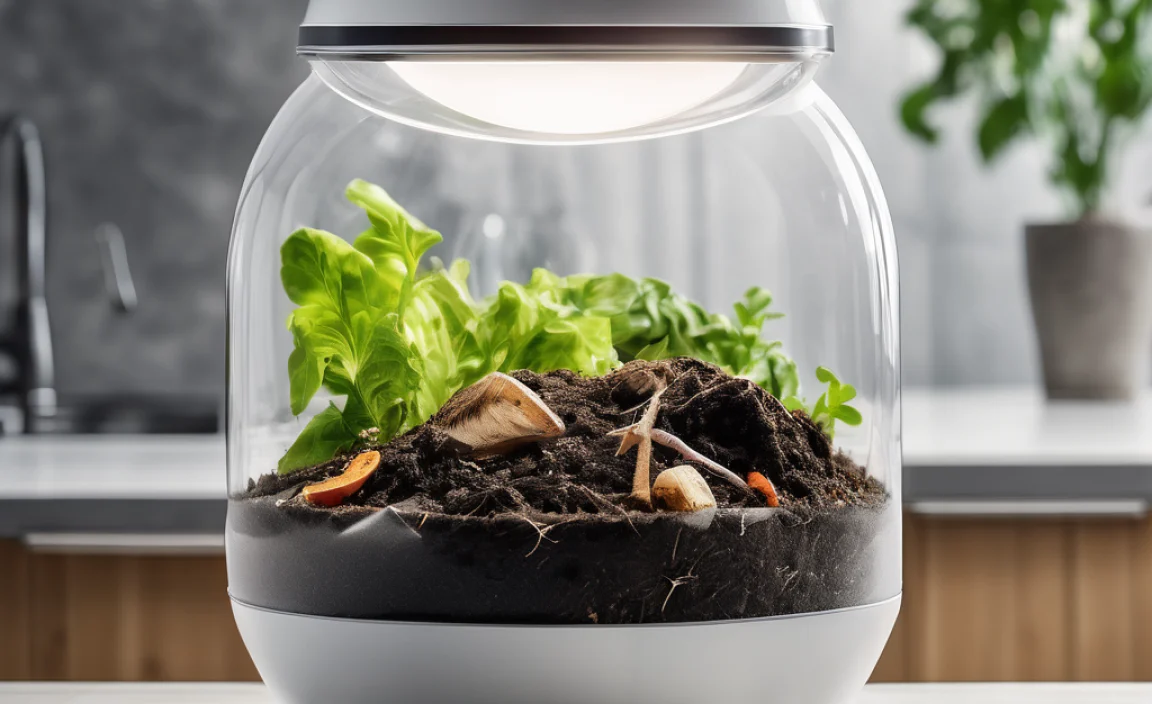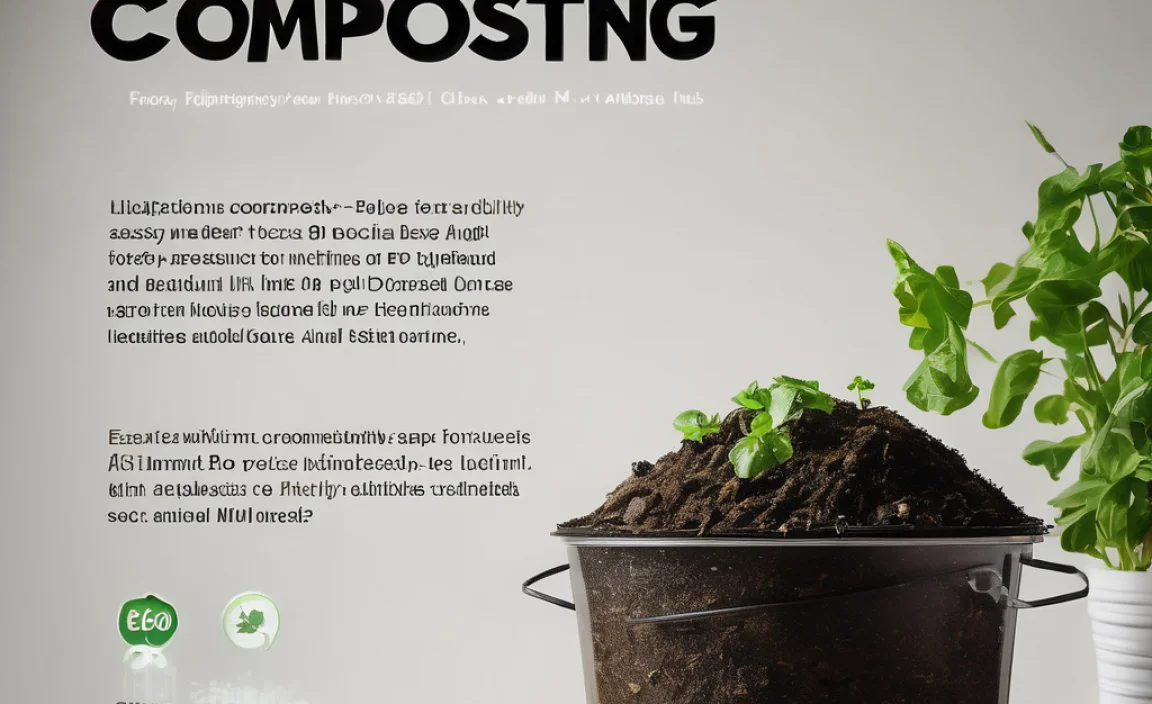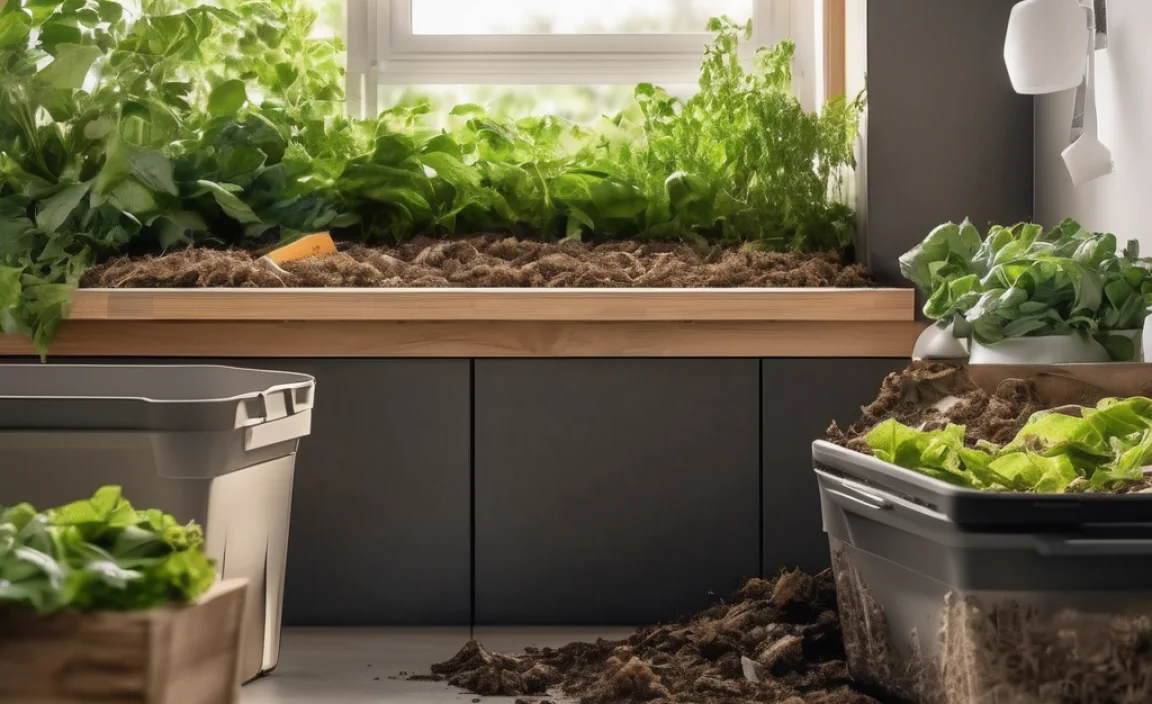Did you know that more than 60% of household waste is organic? Have you ever wondered what happens to all those food scraps and garden waste? In Canada, many families are turning to home composting. It’s a simple and fun way to help the Earth. You can turn waste into rich soil for your garden. Let’s dive into the world of home composting in Canada.
Key Takeaways
- Home composting in Canada helps reduce waste effectively.
- It turns kitchen scraps into nutrient-rich soil.
- Composting is easy and fun for families and kids.
- Reduces the carbon footprint of Canadian households.
- Start with a bin and the right organic materials.
Getting Started with Home Composting

Starting home composting in Canada requires just a few simple steps. First, find a good spot in your yard. Ensure it’s not too sunny or too shady. Next, choose a compost bin. You can buy one or make your own. The third step is collecting materials. Use kitchen scraps like fruit peels and vegetable leftovers. Avoid meat, dairy, and oily foods. Garden waste like leaves and grass clippings are great too.
- Choose a compost bin or make one.
- Select a spot in your garden.
- Collect kitchen scraps and garden waste.
- Avoid meat and dairy products.
- Turn the compost regularly for better results.
Start small if you’re new to composting. It’s a learning process. In the beginning, you may not get everything perfect. That’s okay. Over time, you’ll find the right balance of materials. Your compost will start to look like rich, dark soil. This soil is full of nutrients for your plants. Fun Fact or Stats : Did you know a compost pile can heat up to 140 degrees Fahrenheit?
Choosing the Right Compost Bin
What kind of compost bin should you choose? There are several options available. A simple pile on the ground might work for some. Others prefer a more organized approach. You can buy a plastic or wooden bin from a store. Or, you can make one from old pallets. Each type has its pros and cons. A covered bin keeps pests away. An open pile is easier to manage. Consider your space and needs before deciding.
Collecting the Right Materials
What goes into your compost pile? Not everything can be composted. Start with fruit and vegetable scraps. Add eggshells for extra calcium. Avoid meats and oils as they attract pests. Leaves and grass cuttings are great for adding bulk. Coffee grounds and tea bags are also perfect. Always aim for a mix of “greens” and “browns.” Greens are moist and rich in nitrogen. Browns are dry and provide carbon.
How to Maintain Your Compost Pile
How often should you turn your compost pile? Regularly turning the pile helps it decompose faster. Aim to turn it every few weeks. This adds air to the mix. It also blends the materials evenly. Check the moisture level too. It should feel like a damp sponge. If too dry, add water. If too wet, add more dry materials. Over time, you’ll develop a feel for your compost.
| Material | Type | Benefits |
|---|---|---|
| Fruit Peels | Green | Rich in nutrients |
| Grass Clippings | Green | Fast decomposition |
| Dry Leaves | Brown | Adds structure |
| Eggshells | Neutral | Calcium source |
Benefits of Home Composting

Home composting in Canada has many benefits. It reduces household waste significantly. Fewer waste means less garbage going to landfills. Composting also enriches the soil in your garden. Plants grow healthier with nutrient-rich soil. You save money by not buying fertilizers. It’s also a great way to teach kids about recycling.
- Less waste in landfills.
- Enriched soil for gardens.
- Saves money on fertilizers.
- Teaches kids about recycling.
- Reduces carbon footprint.
Composting is not only good for the environment. It also benefits your family. You can involve children in the process. They learn about nature and science. Seeing waste turn into soil is like magic. Many families find it a fun activity. Fun Fact or Stats : Home composting can reduce waste by up to 30%.
Reducing Waste Effectively
How does composting reduce waste? Each year, Canadians produce tons of waste. A lot of this waste is organic material. Instead of sending it to landfills, composting gives it new life. By turning it into soil, you reduce the waste that needs disposal. This means fewer garbage trucks and less pollution. It’s a small change with big effects. Every bit of waste diverted counts.
Enriching Your Garden
What makes compost soil so special? Compost is rich in nutrients. Plants love it. Gardens with compost grow better vegetables and flowers. It improves soil structure and retains moisture. This means less watering. Compost also balances soil pH. It acts as a natural pesticide. With compost, your garden becomes a thriving ecosystem. Your plants will thank you.
Teaching Kids About Recycling
Why involve kids in composting? Children are naturally curious. Composting is an excellent way to teach them about nature. They learn how waste can turn into something useful. This process shows them the importance of recycling. Kids enjoy gathering scraps and watching the compost change. It’s a hands-on science lesson. Plus, they feel a part of something bigger.
Common Composting Challenges

Home composting in Canada comes with challenges. Bad smells can be a problem. This usually means the pile is too wet. Add more dry materials to fix this. Pests like rodents can be attracted to compost. Use a covered bin or bury food scraps deeper. Another issue is slow decomposition. This can happen if there’s not enough air. Regular turning helps speed up the process.
- Manage moisture to prevent bad smells.
- Use covered bins to keep pests away.
- Turn compost regularly for air circulation.
- Break down large pieces for faster results.
- Mix green and brown materials properly.
Facing challenges is part of the composting journey. But don’t worry. Solutions are simple. With a little effort, these issues can be resolved. Soon, you’ll be creating perfect compost. Fun Fact or Stats : Well-maintained compost piles rarely smell bad.
Dealing with Pests
Do pests love compost piles? Sometimes they do. Rodents and insects might be attracted. But there are ways to prevent this. Keep meat and dairy out of your compost. Use covered bins to protect the pile. Always bury food scraps under other materials. If pests are a problem, consider special bins with pest-proof designs. Soon, you’ll have a pest-free compost.
Solving Moisture Issues
Why is moisture balance important? Too much moisture can cause odors. Too little slows decomposition. The right balance is key. Compost should feel like a wrung-out sponge. If it’s too wet, add dry leaves or shredded paper. If it’s too dry, sprinkle some water. Maintaining this balance ensures your compost breaks down effectively. Over time, you’ll learn what your pile needs.
Speeding Up Decomposition
Want to speed up your compost? A few tricks can help. Break large materials into smaller pieces. This increases the surface area for microbes to work. Turn the pile regularly to add air. Keep a good mix of greens and browns. Consider adding compost starter mix. These steps promote faster decomposition. Soon, you’ll have beautiful compost ready to use.
Conclusion
Home composting in Canada is easy and rewarding. It reduces waste and enriches gardens. With simple steps, you can start today. Involve the whole family for more fun. Remember, composting is a journey. Learn from each step. Soon you’ll be an expert in making rich, healthy soil.
FAQs
Question: What is home composting?
Answer: Home composting is turning kitchen and garden waste into rich soil. It’s a natural recycling process that benefits both the environment and gardens.
Question: How do I start composting at home in Canada?
Answer: Start with a bin and the right materials. Choose a spot in your yard. Collect fruit peels, vegetable scraps, and dry leaves. Turn the pile regularly for the best results.
Question: What are the benefits of home composting in Canada?
Answer: Home composting reduces waste and enriches garden soil. It saves money on fertilizers and reduces the household carbon footprint. It also teaches kids about nature and recycling.
Question: What materials can’t be composted?
Answer: Avoid composting meat, dairy, and oily foods. These attract pests and create bad smells. Stick to fruits, vegetables, and garden waste for the best results.
Question: How can I prevent bad smells in my compost?
Answer: Keep the moisture balanced and avoid adding meat or dairy. Turn the pile regularly to add air. This helps prevent bad odors from developing.
Question: Can I compost in the winter in Canada?
Answer: Yes, you can compost in winter. The process slows down, but it doesn’t stop. Insulate your bin with straw or leaves. Continue adding materials and turn the pile when possible.
.lwrp.link-whisper-related-posts{
margin-top: 40px;
margin-bottom: 30px;
}
.lwrp .lwrp-title{
}.lwrp .lwrp-description{
}
.lwrp .lwrp-list-container{
}
.lwrp .lwrp-list-multi-container{
display: flex;
}
.lwrp .lwrp-list-double{
width: 48%;
}
.lwrp .lwrp-list-triple{
width: 32%;
}
.lwrp .lwrp-list-row-container{
display: flex;
justify-content: space-between;
}
.lwrp .lwrp-list-row-container .lwrp-list-item{
width: calc(25% – 20px);
}
.lwrp .lwrp-list-item:not(.lwrp-no-posts-message-item){
max-width: 150px;
}
.lwrp .lwrp-list-item img{
max-width: 100%;
height: auto;
object-fit: cover;
aspect-ratio: 1 / 1;
}
.lwrp .lwrp-list-item.lwrp-empty-list-item{
background: initial !important;
}
.lwrp .lwrp-list-item .lwrp-list-link .lwrp-list-link-title-text,
.lwrp .lwrp-list-item .lwrp-list-no-posts-message{
}@media screen and (max-width: 480px) {
.lwrp.link-whisper-related-posts{
}
.lwrp .lwrp-title{
}.lwrp .lwrp-description{
}
.lwrp .lwrp-list-multi-container{
flex-direction: column;
}
.lwrp .lwrp-list-multi-container ul.lwrp-list{
margin-top: 0px;
margin-bottom: 0px;
padding-top: 0px;
padding-bottom: 0px;
}
.lwrp .lwrp-list-double,
.lwrp .lwrp-list-triple{
width: 100%;
}
.lwrp .lwrp-list-row-container{
justify-content: initial;
flex-direction: column;
}
.lwrp .lwrp-list-row-container .lwrp-list-item{
width: 100%;
}
.lwrp .lwrp-list-item:not(.lwrp-no-posts-message-item){
max-width: initial;
}
.lwrp .lwrp-list-item .lwrp-list-link .lwrp-list-link-title-text,
.lwrp .lwrp-list-item .lwrp-list-no-posts-message{
};
}
